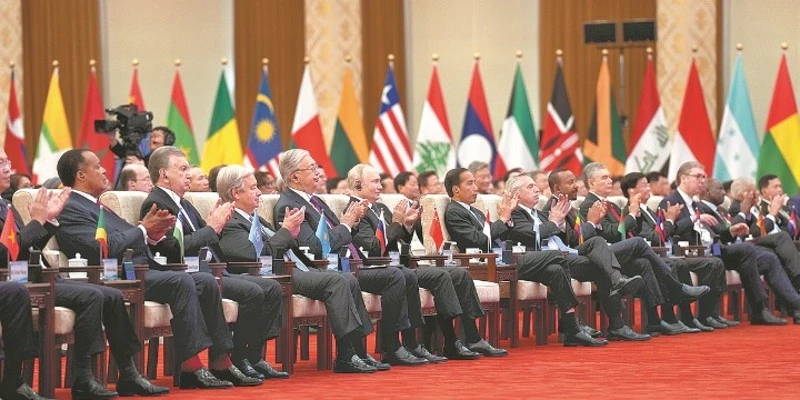China recently organised a high-profile event marking the 10th anniversary of the Belt and Road Initiative (BRI) – an ambitious undertaking to boost connectivity and trade across the world with Chinese investment and know-how.
BRI, the signature foreign policy project of Xi Jinping and hailed as a “project of the century” is a symbol of China’s rise as a global power. As per China, it involves over 200 cooperation agreements with nearly 150 countries (in Asia, Africa, Latin America and East Europe), and 30 international organisations, with commitments made for over 3,000 projects and upto one trillion dollars of investment mobilized. But “tracking BRI financing can be tricky as Beijing does not share this data openly and a wide range of financial entities play role,” notes CNN.
Financed by China’s development banks as well as state-run commercial lenders, Chinese construction firms have paved highways from PNG to Kenya and constructed ports from Sri Lanka to West Africa, and provided power and telecom telecom infra from Latin America to SE Asia, says CNN. But for Xi, BRI does not only involve networks of infrastructure, transport and connectivity, it is equally a network of influence in the global south.
Supporters praise the BRI for boosting the participating countries’ economy and global GDP. At the event, attended by many global leaders including Vladimir Putin, Xi noted that BRI aims to enhance policy, infrastructure, trade, financial and people-to-people connectivity, inject new impetus into the global economy, create new opportunities for global development, and build a new platform for international economic cooperation.
However, critics have been sceptical of BRI’s goals and impact on overseas development. Western governments remain wary of Beijing’s global ambitions. Beijing has been accused of saddling low and middle-income countries with high levels of debt. Sri Lanka ceded control of Hambantota port to China after failing to repay its debt. The projects have faced concerns – and even protests – over environmental concerns, labor violations and corruption scandals, writes CNN. Chinese investments in BRI are tapering as its economy slows and recipient countries struggle to pay debts in a post-pandemic, conflict-ridden world.
Over the last few years, the US and Europe have proposed their investment programs, but there has been more talk than action. Recently, the India-Middle East – Europe Corridor (IMEEC) was unveiled at the G-20 summit.
BRI enjoys little support in Europe or India. Viktor Orban of Hungary was the only prominent European leader to attend. Baltic states have already pulled out of 16+1. And Giorgia Meloni has made her displeasure of BRI public.
Opinion of BRI is more favourable in the global south, e.g., in Pakistan and Bangladesh. China-Pakistan Economic Corridor (CPEC) is a flagship BRI project, but new investments have been slow. With Pak economy in the doldrums, slow progress on Gwadar Port and attacks on Chinese engineers, the Chinese are reluctant to commit to new projects.
What next?
Over the last ten years, there have been rich learnings. In early years, BRI channelled China’s excess capacity overseas and opened new markets for Chinese goods. But as the Chinese economy slows, the program appears to be losing steam. Overseas financing from China’s two development banks to government borrowers dropped from a peak of $87 billion in 2016 to $3.7 billion in 2021. Domestic challenges as well as geo-political headwinds for China abound.
It remains to be seen to what extent Beijing’s domestic economic challenges will impact its overseas lending in the longer term, but there are signs of shifting strategies now.
There is likely to be a move away from grand, often wasteful projects, to small, smart ones with better ROI, such as those in renewable energy and digital technology. Just as Xi undertook the modernisation of PLA to make it lean, mean, less manpower-intensive and more tech-savvy, he may be looking at a course correction.
China may also place more emphasis on environmental issues, better social protections and due diligence.
MitKat helps organisations thrive by pre-empting and managing operational risks and enabling sustainable resilience.
Disclaimer: The article has reference to open sources including CNN and StratNewsGlobal.


